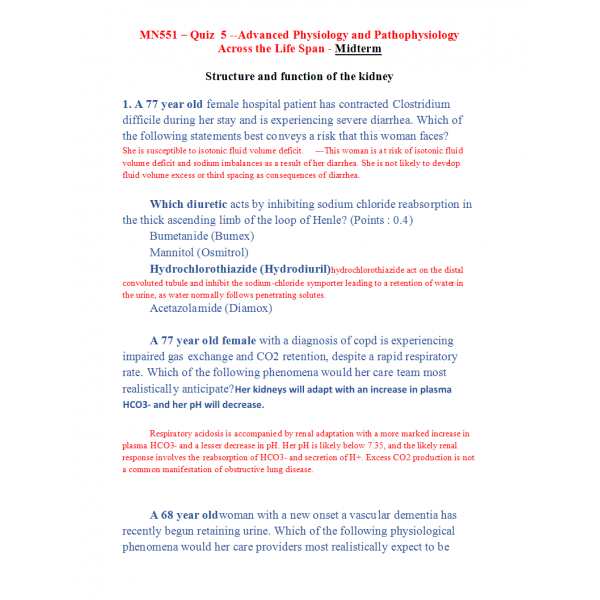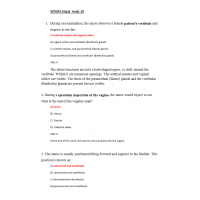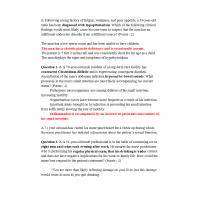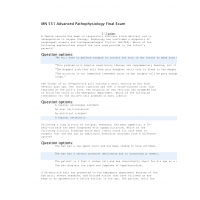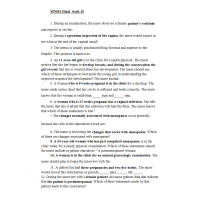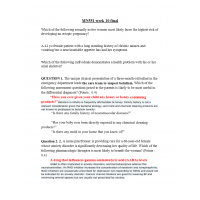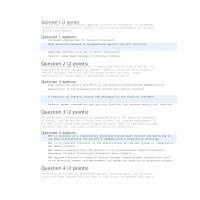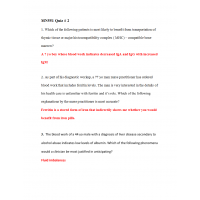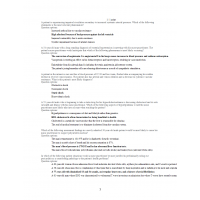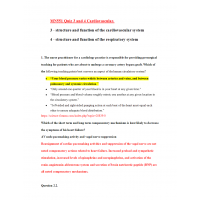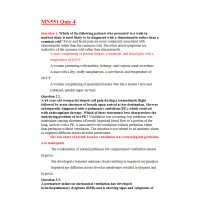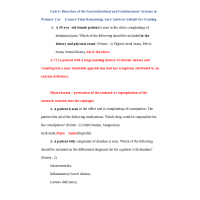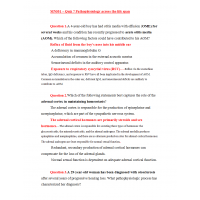MN 551 Midterm Exam 1
MN551 – Quiz 5 --Advanced Physiology and Pathophysiology Across the Life Span – Midterm Exam
1 A 77 year old female hospital patient has contracted Clostridium difficile during her stay and is experiencing severe diarrhea. Which of the following statements best conveys a risk that this woman faces? Which diuretic acts by inhibiting sodium chloride reabsorption in the thick ascending limb of the loop of Henle? (Points : 0.4)
2. At which of the following locations in the nephron would a nurse practitioner first expect blood to be largely free of plasma proteins? (Points : 0.4)
3. A 14-year-old boy who appears to be intoxicated is brought to the emergency department by ambulance. The EMTs report that the boy has denied consuming anything out of the ordinary, but an open antifreeze container was found in the boy's room. Which of the following is likely to be used to treat the patient's symptoms? (Points : 0.4)
4. A 4-year-old boy who has been deaf since birth and has bilateral cataracts has been brought to the emergency department by his mother because she noticed blood in the toilet after he last voided. Urinalysis confirms heavy microscopic hematuria as well as proteinuria. What will the care team's initial differential diagnosis most likely be? (Points : 0.4)
5. A patient is brought to the emergency department with complaints of shortness of breath. Assessment reveals a full, bounding pulse, severe edema, and audible crackles in the lower lung fields bilaterally. What is the patient's most likely diagnosis? (Points : 0.4)
Question 6.6. Which of the following data would a clinician consider to be most indicative of acute renal failure?(Points : 0.4)
7. Which of the following substances is most likely to be reabsorbed in the tubular segments of the nephron using passive transport mechanisms? (Points : 0.4)
8. A 60-year-old man has been diagnosed with renal calculi after repeated episodes of excruciating flank pain in recent weeks. The man states, “I don't know how this could happen to me, since I'm so careful about eating a healthy diet.” What is the most appropriate response to the man's statement? (Points : 0.4)
9. An 82-year-old resident of a long-term care facility with a recent history of repeated urinary tract infections and restlessness is suspected of having urinary retention. Which of the following actions by the care team is most appropriate? (Points : 0.4)
10. A 34-year-old male patient has diagnoses of liver failure, ascites, and hepatic encephalopathy secondary to alcohol abuse. The patient's family is questioning the care team about why his abdomen is so large even though he is undernourished and emaciated. Which of the following statements most accurately underlies the explanation that a member of the care team would provide to the family? (Points : 0.4)
11. A pediatric unit will be receiving from a rural medical outpost a patient transfer of an 8-day-old infant with a suspected congenital renal disorder. Which of the following possibilities is the care team most likely to be able to rule out early? (Points : 0.4)
12. A 22-year-old female with a history of intermittent flank pain, repeated UTIs, and hematuria has been diagnosed with autosomal dominant polycystic kidney disease (ADPKD). Which of the following phenomena has most likely contributed to the development of her health problem? (Points : 0.4)
13. A patient with poorly controlled diabetes mellitus presents to the emergency department with suspected ketoacidosis. Which of the following diagnostic results would be most likely to confirm this diagnosis?(Points : 0.4)
14. A 55-year-old man has made an appointment to see his nurse practitioner because he has been awakening three to four times nightly to void and often has a sudden need to void with little warning during the day. What is the man's most likely diagnosis and possible underlying pathophysiologic problem? (Points : 0.4)
15. Which of the following patients on a medical unit of a hospital is most likely to be experiencing health problems that may be attributable to kidney disease? (Points : 0.4)
16. Following several days in an acidotic state, a hospital patient has returned to the desired pH. Which of the following processes could have contributed to the resolution of the patient's health problem?(Points : 0.4)
17. Which of the following patients would be considered to have a significant risk of developing the prerenal form of acute renal failure?
18. A 25-year-old Asian American man arrives at the emergency department in a panic. Except for a bout with bronchitis a week earlier, he has been healthy his entire life; today he has blood in his urine. What is the most likely cause of his hematuria and how should it be treated? (Points : 0.4)
19. An 81-year-old female has long-standing hypocalcemia secondary to kidney disease and will shortly be moving into an assisted living facility from her own apartment. Which of the following findings should staff at the facility be instructed to observe for? (Points : 0.4)
20. A nurse educator is orientating new nurses to a renal unit of a hospital. Which of the following teaching points should the nurse include as part of a review of normal glomerular function? (Points : 0.4)
21. Which of the following individuals is at the highest risk for developing a urinary tract infection (UTI)? (Points : 0.4)
22. A 61-year-old woman who has had an upper respiratory infection for several weeks has presented to her nurse practitioner with complaints of a recent onset of urinary retention. She reveals to her nurse practitioner that she has been taking over-the-counter cold medications at higher than the suggested dose for the past two weeks. Which of the following phenomena will her nurse practitioner most likely suspect is contributing to her urinary retention? (Points : 0.4)
23. Which of the following individuals are displaying identified risk factors for the development of lower urinary tract obstruction? (Points : 0.4)
24. A 51-year-old woman diagnosed with multiple sclerosis (MS) five months prior is distressed that she has had several recent episodes of urinary incontinence. She has asked her nurse practitioner why this is the case. Which of the following statements best captures the facts that would underlie the nurse's response to the patient? (Points : 0.4)
25. Which of the following individuals would be considered to be at risk for the development of edema?(Points : 0.4)
| Institution & Term/Date | |
| Term/Date | Kaplan University |
-
$25.00

